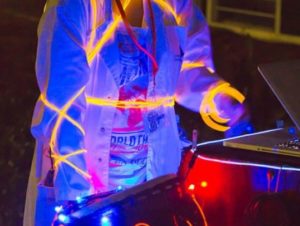
Successful women in the fields of science, technology, engineering and mathematics (STEM) are ‘taking it to the streets’ for National Science Week (13-21 August).
The faces of high-achieving women in science will shine in surprising places as part of the Flinders Illuminating the Face of STEM campaign.
In a bid to open the public’s eyes and minds to science and the bright achievements of female scientists, a special architectural illumination on Flinders University’s Victoria Square building will be held on Friday 19 August.
The Flinders promotions in the city will include mobile demonstrations in and around Rundle Mall featuring illuminations of women who have made notable contributions in STEM fields.
The project aims to encourage gender equity in the sciences while inspiring the general public to take an interest in science.
The Flinders Victoria Square building (182 Victoria Sq, Adelaide) will be used in the major illumination display from 7pm-9pm on 19 August.
Earlier in the week (15 and 17 August) students and staff from Flinders Faculty of Science and Engineering will lead the Illuminating the Face of STEM women promotions around the city.
Wearing lab coats and digital animations, they will be staging random mobile projections in Rundle Mall and around Adelaide to tell stories about their research and career paths in the sciences.
SA Chief Scientist Dr Leanna Read, Flinders Distinguished Professor Karen Reynolds and Flinders nanotech Professor Amanda Ellis, mathematician Professor Cheryl Praeger and well-known SA physicist Professor Tanya Monro will among those profiled in the campaign.
Others include University of Adelaide Associate Professor Inge Koch, South Australian biotechnology leader Dr Meera Verma, environmentalist Lauren Houthuysen and other outstanding STEM women from the past and present.
“The project aims to break down the stereotype that STEM careers are predominantly for males, and so inspire more girls and women to pursue careers in the field of science,” says STEM Women Branching Out spokeswoman Dr Maria Parappilly.
“This initiative also aims to increase the visibility/authority of women in science which is a key element in attracting young women to science,” she says.
The Australian Mathematical Sciences Institute in 2014 found a significant under-representation of women in STEM fields, with just 33% of all tertiary qualifications in STEM fields taken by females.
Flinders STEM Women Branching Out Group, which organised the National Science Week project, is supported by Dr Parappilly, Dr Sherry Randhawa, Associate Professor Karen Burke da Silva, Associate Professor Claire Lenehan, Ms Natalie Venning, Dr Margaret Shanafield and students.
The group is also launching at Flinders at Tonsley the Science 50:50 initiative on 19 August. The launch is open to the public, especially high school teachers and students.
The Illuminating the Face of STEM campaign received a $15,000 New Initiatives National Science Week SA grant. Leading South Australian projection art company, Illuminart, developed the creative content.
The initiative is supported by the Australian Government’s Inspiring Australia (Science in Public) program as part of National Science Week.
The project also received assistance from the office of Flinders University’s Deputy Vice-Chancellor (Research) Professor Robert Saint, the Australian Institute of Nuclear Science and Engineering, and the Science in Australia Gender Equity (SAGE) Athena SWAN project.
The SAGE program, which is a partnership between the Australian Academy of Science and the Australian Academy of Technological Sciences and Engineering (ATSE), last year launched the first Australian trial of the successful UK Athena SWAN gender equity accreditation program.
Flinders University is part of the national pilot project to help promote and retain more women in the traditionally male-dominated fields of science, technology, engineering, mathematics and medicine (STEMM).

